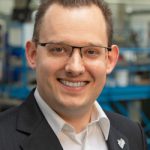In Person Only
13-Ultra-Precision Machining Technology
Lars Schönemann, Leibniz-Institute for Materials Engineering IWT
Tuesday, October 11, 2022
1:30PM – 5:30PM (PDT USA)
Ultra-precision machining with monocrystalline diamond tools is a core technology for generating high precision parts and optical surfaces. A short introduction to the topic will establish a common understanding of requirements, possibilities, and challenges including the general prerequisites, machine tool configurations, applicable tool types and shapes, as well as necessary auxiliary processes, such as tool setting and balancing.
The second part of the tutorial will particularly focus on examples for manufacturing challenging parts, from both research and industrial point of view. This includes the manufacture of non-rotational symmetric mirrors by Fast Tool Servo and Slow Slide Servo turning, the milling of freeform shapes, and the generation of functional surface structures like holograms, microlens-arrays and prismatic features.
In the third part, more material-related issues will be presented, i.e. difficult-to-cut materials and possible approaches applied in diamond cutting, such as laser-assisted or ultrasonic-assisted machining.
The tutorial will close with an outlook and discussion on more recent research topics, like ultra-precision high performance cutting, and possible future perspectives in the digitalization of ultra-precision manufacturing.

Lars Schönemann is a senior scientist and group leader at the Laboratory for Precision Machining, a department of the Leibniz Institute for Materials Engineering in Bremen, Germany.
Lars has more than 14 years of experience in precision and ultra-precision machining, particularly in mold making for plastic optics by diamond milling, the manufacture of functional surfaces structures by nano Fast Tool Servo assisted turning and Diamond Micro Chiseling, as well as mechatronic system development for tool setting and balancing. His current research work focuses on the digitalization of precision machining processes and the combination of additive and subtractive machining processes (hybrid machining). He has experience in managing large-scale national and international projects, such as the German research unit FOR1845 “Ultra-precision high performance cutting” (2014-2020) and the European H2020-project “ProSurf – High Precision Process Chains for the Mass Production of Functional Structured Surfaces“.
Lars has a Bachelor’s (2006) and Master’s degree (2008) in Systems Engineering from the University of Bremen, specializing in embedded systems and system software. He obtained his doctorate (Dr.-Ing.) in 2014 for his work on Diamond Micro Chiseling of prismatic optical microstructures. He published more than 50 papers and presented his work at various international conferences, such euspen conferences and topical meetings, CIRP conferences, and ASPE annual meetings.

